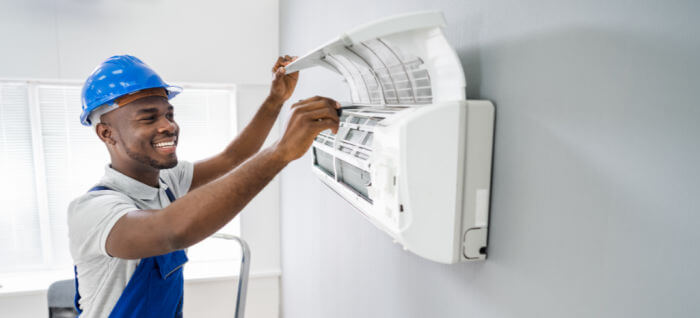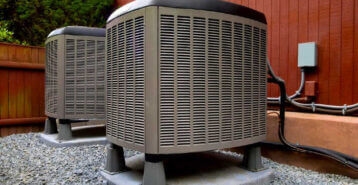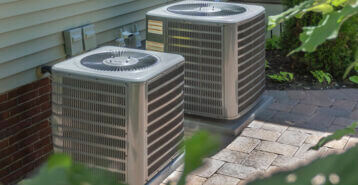Are you doing an HVAC project?
Modernize can pair you with three to four pros in your area, so you can compare options and save time and money.
Realizing you need to replace an HVAC system in your home can be a stressful experience, especially if it is an emergency situation in the middle of winter or summer. But at the same time, replacing your AC and heating system is a good thing for your home’s functionality, utility costs, and value. To help alleviate the headaches that often come along with an HVAC replacement, the experts at Modernize created this HVAC financing checklist to help you develop a financial strategy for your next repair or replacement project.
Financing an HVAC System: Before Contacting a Contractor
Without a doubt, finalizing an HVAC financing plan involves finding and meeting with a professional to discuss your options. But before you do this, there are a few components to go over on your own. Before getting in touch with an HVAC professional, be sure to review the following items:
1. Know Your Budget
Creating a budget is an important first step to any home improvement project, and an HVAC replacement or repair is no different. Total costs can range anywhere from a few thousand dollars to over ten grand, with systems offering various short- and long-term savings potentials. A good place to start budgeting for your specific HVAC needs is Modernize’s HVAC cost calculator.
2. Prepare for Unexpected Costs
Unfortunately, not every home renovation project or repair goes according to plan. Contractors can run into unexpected scenarios in your home that result in added costs. For instance, if a professional starts an HVAC replacement and finds damaged ductwork or electrical systems, they may need to make additional repairs or replacements.
In addition to estimating the total cost of a project, homeowners should also be aware of and prepare for hidden HVAC replacement costs, and set some extra budget aside, just in case.
3. Learn About HVAC Types and Sizes
While a contractor will help you finalize what type and size HVAC system will be best suited for your home, familiarizing yourself with these topics ahead of time can help you build a reliable budget.
Knowing the uses for and pros/cons of cooling only split-systems, ductless systems, heat pumps, and packaged-systems, as well as what size HVAC system you need for your home is invaluable to know before starting your project.
4. Explore Rebate Opportunities
In a push for increased home energy efficiency, government agencies at the state and national level offer a variety of grants and rebates to help with home renovation projects—including HVAC replacements or repairs. You can help offset your project costs by exploring these government rebate options and applying for any you are eligible to receive.
5. Assess Equity Options
Paying for any home project can feel like a burden, especially if it’s an unexpected repair. Two common ways to leverage your home for credit include home equity lines of credit (HELOC) and loans. An experienced installer will have valuable expert advice regarding these HVAC financing options, as will a mortgage finance expert.
6. Know Your Local Permitting Requirements
Large-scale home improvement projects are not the only ones that require building permits. Many home replacements require local approval as well. When the time comes for your HVAC project, understanding and securing the proper permits is a crucial step for any homeowner. A local contractor should be able to help you in this process.
Financing an HVAC System: While Selecting a Contractor
After you have done some preliminary research, you can begin the process of selecting a contractor for your HVAC project. Here are our top tips for financing an HVAC system to keep in mind during the hiring process:
1. Inquire About a Down Payment
A contractor might need to conduct ductwork or modifications to a home prior to installing a new HVAC unit. In this case, they may request a down payment.
Find the Right Contractor for Your HVAC Project
Whether you’re ready to begin your project now or need some expert advice, our network of contractors are here to help. With a few simple questions, we’ll find the best local professionals for you
Homeowners typically pay about 20% of the final HVAC quote as a down payment. But be wary — if a contractor requests large sums of cash as an upfront payment, this could be the sign of a scam. Our how-to guide for vetting an HVAC professional can be helpful during this process.
2. Compare Financing Offers
In recent interviews, Modernize found that 40% of homeowners plan to finance up 50% of their HVAC project.
With so many financing options available, it is important to compare each HVAC financing method and learn the impact they would have on your finances. Be sure to compare the terms, interest rates, fees, debt types, payment methods/plans, and any extra benefits of each finance option.
3. Compare contractor quotes
After reaching out to contractors, each company should provide you with a quote for the project based on your specific needs. Modernize recommends comparing three to four quotes for your HVAC project. Evaluating multiple HVAC replacement quotes helps homeowners scope their budget and encourages competitive pricing.
4. Negotiate costs
In addition to helping you find the best contractor for your personal and financial needs, the process of comparing contractors can allow homeowners to negotiate prices.
Many businesses are willing to lower their bid or match competitor pricing if they know work might go to someone else. However, be transparent about shopping around from the start of your conversations. This can help to form positive working relationships with professionals you may potentially hire.
Financing an HVAC System: After Completing the Project
Even after completing your HVAC project, there are financial tips to keep in mind to help you save the most money possible.
1. Register for a Warranty
After installation of your new HVAC system, don’t forget to explore warranty options and register your system to protect your investment. There are typically two HVAC warranty types to choose from — the manufacturer warranty and the installer warranty. Together, the two warranties should entirely cover your new HVAC system, from parts and installation to maintenance.
2. Understand Long-Term Savings
Some homeowners forget about the long-term costs involved with running their new AC unit and heating system. Even after financing your HVAC system, it is a good idea to practice smart habits to reduce energy when possible and save money in the long-term. Learn how to cool your home efficiently, perform end-of-season AC unit maintenance routinely, and replace air conditioner filters twice a year in the spring and fall. Explore our Savings Guide to find more ways to cut HVAC costs.
With this HVAC financing checklist at your fingertips, the pros at Modernize can help connect you with trusted contractors in your area and walk you through the process from education to completion.
Find the Right Contractor for Your HVAC Project
Whether you’re ready to begin your project now or need some expert advice, our network of contractors are here to help. With a few simple questions, we’ll find the best local professionals for you
Reviews from Real Homeowners
Welcome to Homeowner Resources! We are the Modernize blog. Modernize pairs more than 3 million homeowners a year with pre-vetted contractors in their area. This blog started because we believe homeowners should know everything about their homes, from how their HVAC works to which front door colors they might love. On Homeowner Resources, you can find information on every part of your home, right down to how you can negotiate with contractors to get the best price. Here's more about the blog.
Need a contractor? Learn more about how Modernize finds the right pro for you.




